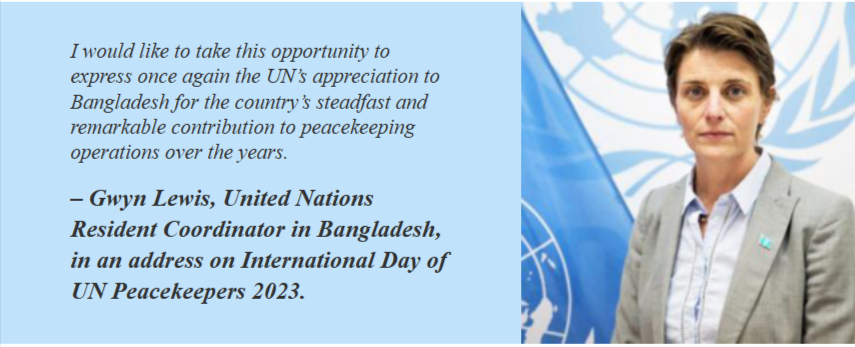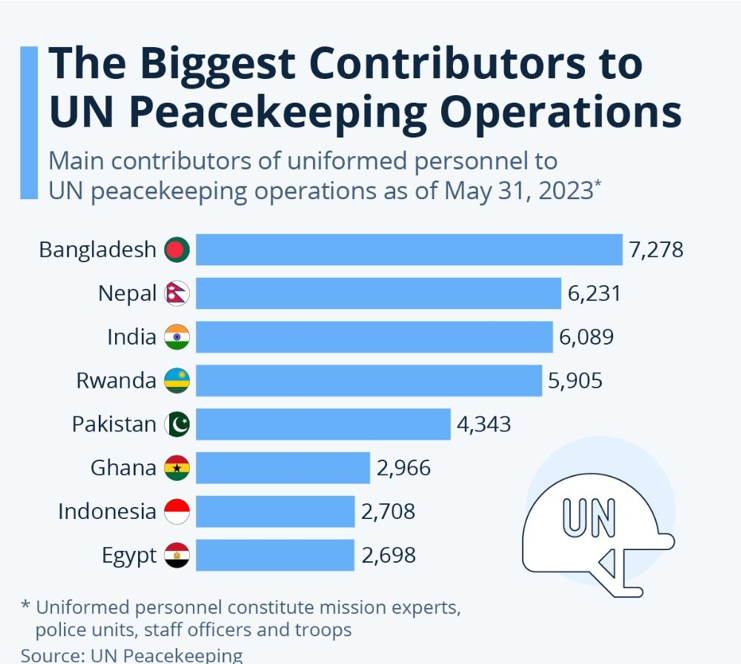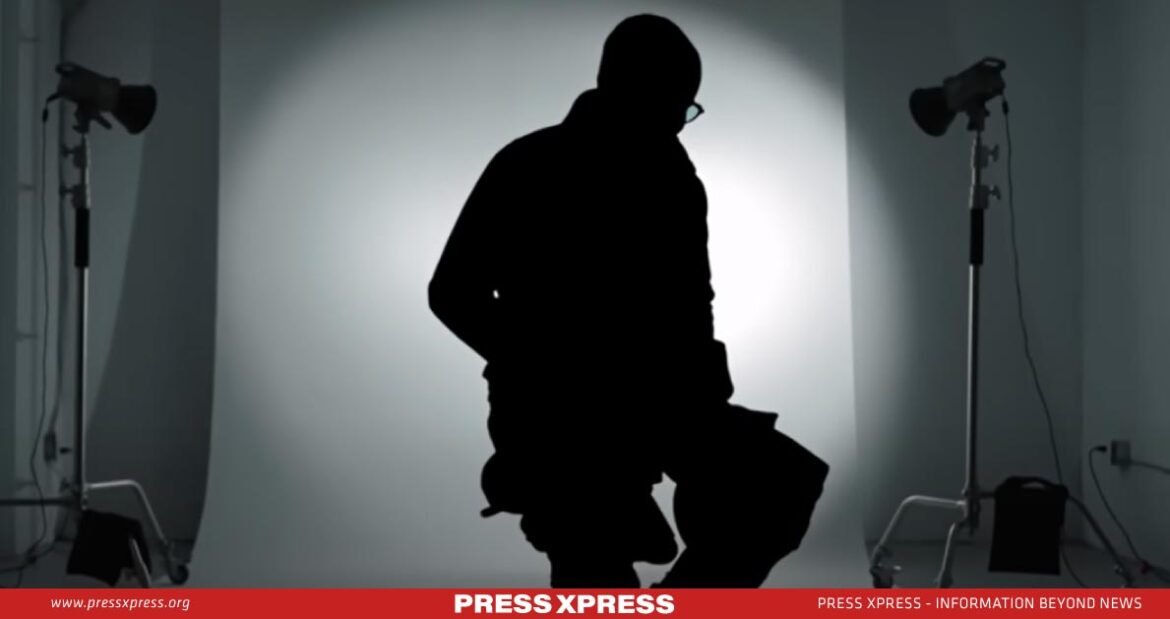During a press briefing on Wednesday, a spokesperson for the UN Secretary-General, Stéphane Dujarric, debunked DW’s recent allegations that the UN blindly hires ‘human rights abusers’ from Bangladesh to run its peacekeeping missions.
Earlier, a documentary titled “Bangladesh: Human rights abusers go on UN missions,” aired by Deutsche Welle on May 21, 2024. This documentary is based on falsehoods and misleading information, aiming to tarnish the reputation of Bangladesh’s armed forces and the Rapid Action Battalion (RAB).
You can also read: Can Duetsche Welle violate their own rules and regulations on Bangladesh context?
When asked, the Secretary-General’s spokesperson, Dujarric, acknowledged that they were indeed aware of both the documentary and the allegations made within it. He referred to the statement made by the UN’s peacekeeping department in the documentary, emphasizing the organization’s dedication to ensuring that personnel deployed on peacekeeping missions adhere to the highest standards of efficiency, integrity, and respect for human rights.
DW’s One-Sided Framing
While the documentary purports to examine the involvement of Bangladesh and Sri Lanka’s armed forces in UN peacekeeping missions, it intentionally singles out Bangladesh in its headline, seemingly with the intent to degrade and undermine the country’s army and RAB.
The tone and theme of the latest DW documentary are the same—that is, branding Bangladeshi security forces as human rights abusers and pushing for Bangladesh’s exclusion from peacekeeping missions.
It made sweeping allegations without presenting any concrete evidence. It claimed that after their stint in RAB, officers are often sent on highly-paid UN deployments and cited an anonymous “former RAB commander” who was “personally involved in human rights abuses and later deployed to a UN mission”. But regrettably, the DW failed to present any convincing evidence to substantiate the allegations.
Senior journalist and researcher Ajoy Dasgupta told media that DW published its content without speaking to the authorities concerned in Bangladesh. He said that media outlets like DW and Netra News have been publishing anti-Bangladesh news, adding, “This fabricated documentary is ill-motivated and unacceptable.” He hoped that the UN would unmask those campaigning against Bangladesh and other troops contributing countries.
How far the DW stories are true is a matter of secondary importance. In the first instance, a couple of things come to our notice. The US Assistant Secretary of State for South and Central Asian Affairs Donald Lu visited Bangladesh on May 14-15, 2024. The United States slapped sanctions on the former chief of the Bangladesh Army General (Retd) Aziz Ahmed on May 20, and the DW report and video appeared on the following day May 21, 2024. This chain of events has every reason to believe that the gripping narrative of Bangladeshi peacekeepers carefully crafted by DW team is a premeditated attempt to discredit the Government of Bangladesh particularly the Prime Minister Sheikh Hasina.
UN Response to DW’s Allegations
DW alleges that the UN is turning a blind eye to Bangladeshi peacekeepers while hiring them. But the prying eyes of the DW and its investigation team do not fall upon the outright violations of human rights in countries such as Pakistan, Myanmar, Israel and even the USA.
In repose to the documentary, the United Nations has said it follows a three-step screening process when deploying troops in the peacekeeping missions to meet the highest standards of efficiency and integrity, including respect for and commitment to human rights.
“Look, there are three parts to the screening. One thing involves self-certification; the other one involves the certification by the sending country, and obviously, there’s a procedure also by the High Commissioner’s Office for Human Rights,” Spokesman for the Secretary-General, Stephane Dujarric, told a regular briefing at the UN headquarters in New York on May 22.
“Yes, we’ve seen the documentary and our colleagues in the peacekeeping department have been interacting and gave a statement to the producers,” said the spokesman.
The UN appreciates Bangladesh for its “steadfast and remarkable contribution” to peacekeeping operations over the years.

An Evil Partnership?
The documentary was produced in partnership with notorious so-called media platform ‘Netra News’ run by Sweden-based Tasneem Khalil.

Netra News is funded by CIA’s sister-concern National Endowment for Democracy (NED). In places where the CIA fails to directly intervene, it uses NED to promote anti-government parties.

Washington uses NED to fund various media and selected people. It’s the US’ favorite tool for regime change in other countries under the pretext of establishing democracy. In 1991, its founder Allen Weinstein told the New York Times that NED was the ‘second CIA’.
Netra News has run a vicious campaign against Prime Minister Sheikh Hasina and circulated fake news about Bangladesh.
Tasneem, a controversial journalist coming from a family of anti-liberation supporters, fled Bangladesh in 2007 and has since been engaged in anti-state conspiracies from Sweden. He was sacked by the Daily Star for running intentional and biased news.
Here the ethical question arises: How can a world-renowned media, DW, partner with the infamous and biased Netra News? Tasneem Khalil’s biasedness and grievance against the Bangladesh government make the documentary questionable that is the report pre-scripted against Bangladesh and its army?

Going Against Journalistic Norms
DW used some drone footage of UN training Bangladesh Institute of Peace Support Operation Training (BIPSOT) activities as they promised to make a positive report on its training activities, but instead DW used the footage to make a negative propaganda story against the Bangladesh Army. That is a grave violation of journalism norms.
As shown in the documentary, two unnamed RAB commanders in disguise explained the murder process to create a dramatic effect. But without any connection given the whole thing remains ambiguous.
Interestingly, the man who put up an RAB Torture Show at 4:20 seconds appeared to be Tasnim Khalil himself. The same person appeared in DW’s another documentary on RAB published last year. So, the questions arise that are the whistleblowing statements scripted? What is the motivation behind this?


The documentary alleged that three amongst one hundred RAB officers who went on peacekeeping missions were engaged in serious rights violations. But again, failed to provide any evidence. There are no other domestic media reports found with such allegations.

Seeking Bangladesh’s exclusion from UN peacekeeping missions?

Over the past three decades, Bangladesh has steadily risen to become one of the largest troop contributors to such missions worldwide.
Currently, more than 6,000 Bangladeshi peacekeepers are participating in several missions to promote world peace. Since 1988, about 200,000 Bangladeshi peacekeepers have completed their missions in 43 countries around the world. Furthermore, in the mission area, 168 Bangladeshi peacekeepers lost their lives in conflict and hostile situations, while 266 sustained injuries.
According to 2023 data from the Public Relations Department of the Armed Forces, more than 87,000 peacekeepers from 125 countries are serving in 12 UN peacekeeping operations.

Senior journalist Ajoy told media that the UN has lauded Bangladesh for successfully combating militancy and terrorism.
DW’s partial framing and thriller movie like documentary contains no solid data but some flimsy words which advocates the exclusion of Bangladesh’s heroic fighters from the UN peacekeeping missions. The questions arise that why a media like DW endorses such agenda and who are behind the scene?
Security analyst Major General (Retd) Mohammad Ali Shikder said, “If there are any criminals among the Bangladeshi peacekeepers, it may be a handful. Unless proven by a legal process, a charge against someone does not necessarily imply an accusation or guilt. As per international law, a complaint against someone does not necessarily mean that the person is guilty.”
“Those who are raising the questions are not giving any source. This is a purely speculative allegation,” he added.
Conclusion
The DW documentary relied on anonymous accounts and unverified documentation to paint a highly inaccurate and myopic picture of Bangladeshi armed forces in the UN; particularly targeting RAB. The publication of the documentary on the eve of the US reconsideration of Sanctions against RAB also makes the timing appear highly susceptible.
Bangladesh’s track record in UN peacekeeping is not only proven via various accolades and statements; but is also internationally recognized. A body such as the UN; with its rigorous standards and modus operandi would not allow Bangladesh to be the largest contributor to UN peacekeeping missions without extensive checks and strong oversight.
The fact that Bangladeshi peacekeepers have been successfully deployed to over 40 peacekeeping missions alone proves their invaluable contribution to UN peacekeeping missions; as well as the UN’s trust in Bangladeshi troops to perform their duties.


